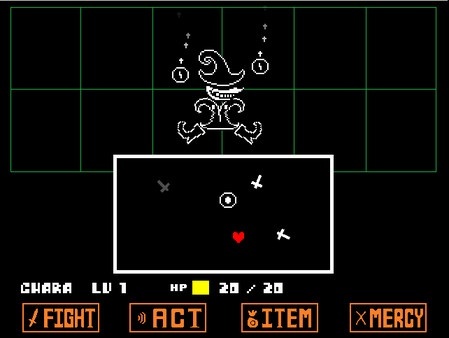Undertale (PC) Review
By Renan Fontes  29.12.2015
29.12.2015

Undertale is an interesting beast. In a year that was primarily filled with sequels, spin-offs, and ports, it stood almost entirely alone as one of the few fresh concepts. While it does take rather heavy influences from EarthBound and other SNES JRPGs, it doesn't stop Undertale from being one of the most original titles of 2015.
After a war between humans and monsters, the monsters were driven to live underground, while the humans lived on the surface. Undertale follows the story of a child who's fallen into the underground, and their journey to get back home.
Right off the bat, Undertale's appeal becomes very clear. It's the "friendly RPG where nobody has to die," after all. Combat works one of two ways: enemies can either be killed for experience points and gold, or spared for gold, but no experience points.
To kill an enemy, the Fallen Child simply has to attack them like in any other RPG. While Undertale does want the player to put more stock in the "Spare" aspect, the fighting itself works well enough with timed presses, keeping a strict focus on the combat at all times. To add to this, dodging enemy attacks boils down to bullet hell-esque mini-games, where the Fallen Child has to dodge bullets, stop moving altogether, or run into them depending on the situation, making focus a necessity in any encounter.
Sparing an enemy is where Undertale gets really interesting. Along with a "Fight" option, there is also an "Act" function during battle. Acting consists of either checking an enemy or directly interacting with them. Interacting can range from flirting with them, telling them a joke, picking on them, to even threatening them if the situation calls for it. Already a unique and engaging concept, it's further elevated by its top notch execution. Every single enemy has its own unique set of options, with its own way of ending the conflict without resorting to violence.
In a lot of ways, the sparing mechanic functions like a puzzle. Undertale is filled with them, and puzzles are established as an everyday occurrence in the Underground from early on. It makes sense that this story element would tie into the gameplay, but it's also impressive. Tying story into gameplay isn't something that happens nearly enough, but this game thrives on it.

Just about every aspect of the gameplay manages to fall back into the story in some way; from saving the game, to dialogue options, to who must be killed. Characters remember the Fallen Child's every move, and their every move affects the world. At times, it's grandiose, changing the course of the story and affecting the ending. At other times, it's smaller and only affects certain characters.
The Underground is alive beyond imagination. Every NPC feels wholly unique and fleshed out enough where even the most minor and trivial ones linger in the mind. The main cast is, perhaps, the strongest attribute writing-wise. Everyone has a great deal of depth, making the monsters very human-like in nature. Compared to other RPGs that are content in having archetype characters with minimal development, Undertale stands as a highpoint for character writing in gaming in general.
Dialogue is almost always humorous, but it is in this humour that Undertale is able to make its world so relatable and enjoyable. It allows the more dramatic moments to carry a heavier weight to them, as well. The story takes many twists and turns depending on the Fallen Child's actions, but the writing manages to stay consistently strong throughout all possible routes.
Undertale has many strengths, but its greatest one is its atmosphere. The combination of scenery and music make for countless memorable moments. Just about every screen manages to leave an impact. The Fallen Child's journey has a childlike wonder to it; whether it be a wonder for adventure, or one for games with true passion behind it, Undertale harbours something magical in its presentation.
It is not without fault, however. It is painfully short. A first playthrough can be completed in as little as three hours. Four or five with some intense exploration. The short length is almost justified in that Undertale is meant to be replayed multiple times for the full experience, but getting to the ending the first time around feels almost wrong. It manages to hold a pretty consistent pace throughout, but this makes for an ending that seems to come out of almost nowhere.

Cubed3 Rating
Exceptional - Gold Award

It's very short. Even getting all the main endings can be done in under 20 hours, but aside from that, Undertale is a tour de force to be reckoned with. It's filled with heart, humour, and raw emotion, while never forgetting that it's a game. Its gameplay is just as strong as its stellar writing. Undertale is a crowning achievement in RPGs and games in general.

![]() 9/10
9/10
![]() 10/10
(1 Votes)
10/10
(1 Votes)
 Out now
Out now  Out now
Out now  None
None  Out now
Out now Comments
Comments are currently disabled

 Sign In
Sign In Game Details
Game Details Subscribe to this topic
Subscribe to this topic Features
Features





 Top
Top

